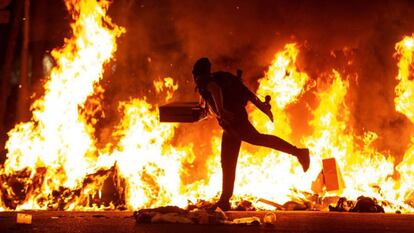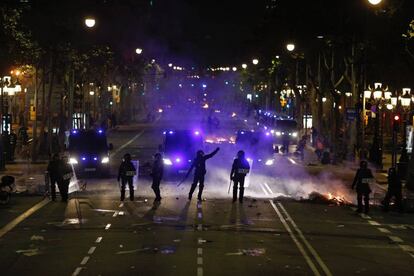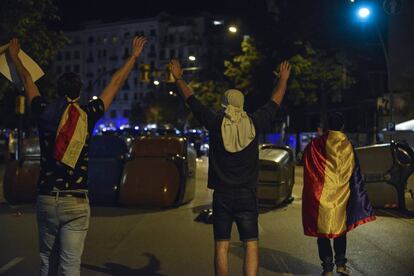Spain’s PM seeks joint response to growing street violence in Catalonia
There were 51 arrests and 125 people were injured following a night of clashes between police and protesters who lit fires and erected barricades in Barcelona, Tarragona, Sabadell and Lleida

Following a night of unrest in several Catalan cities over the sentencing of nine secessionist leaders, the Spanish government issued a statement late on Tuesday pointing at “coordinated groups that are using street violence to break the social harmony in Catalonia.”
Caretaker Prime Minister Pedro Sánchez, of the Socialist Party (PSOE), has asked the three main opposition leaders to meet with him on Wednesday to discuss a coordinated response to the escalating events. Pablo Casado of the Popular Party (PP) Albert Rivera of Ciudadanos (Citizens) and Pablo Iglesias of Unidas Podemos will meet with Sánchez individually. The country is facing a repeat general election on November 10.
The Catalan premier, Quim Torra, is also meeting with some of his top aides this morning to discuss the events of Tuesday, which resulted in 51 arrests and left 125 people injured, 72 of them police officers, according to Catalan health services.
Arrests were made in Barcelona, Tarragona, Lleida and Sabadell after protesters lit fires and erected makeshift barricades on the streets of major Catalan cities to protest the Supreme Court ruling that handed down prison terms to leaders of the illegal breakaway bid of 2017. These nine leaders have condemned the recent violence in a Twitter message.

Protests continued on Wednesday morning with new cuts to the high-speed railroad service AVE between Barcelona and Figueres (Girona), and roadblocks on the A-2 and AP-7 motorways.
“All our support for the mobilizations and the massive, peaceful marches. Violence does not represent us.”
A night of clashes
Dramatic scenes were seen on Tuesday night in Barcelona, where firefighters worked to put out the flames on Passeig de Gràcia and riot police remained stationed on the central boulevard well into the night, while helicopters hovered overhead.

While a grassroots pro-independence organization called Assemblea Nacional Catalana (ANC) had called for sit-ins outside the Spanish government’s delegations across Catalonia, several hundred demonstrators turned the peaceful protests into street battles, setting fire to trash containers, erecting barricades and hurling objects at riot officers from the national and Catalan law enforcement agencies, who responded with baton and rubber bullet charges.
The disturbances were particularly serious in Barcelona, where around 40,000 people had congregated according to local police estimates. They followed an earlier day of protesting on Monday, when thousands of independence supporters blocked access routes to Josep Tarradelles-El Prat airport, causing more than 100 flight cancellations.
The Committees to Defend the Republic (CDR), a grassroots network that advocates direct action, has already described these events as “Rosa de foc”, or “rose of fire,” the name given to the city of Barcelona during the so-called Tragic Week of late July 1909, where violent confrontations between the Spanish army and working classes, who were against the calling-up of reserve troops to fight in Morocco, resulted in around 80 deaths in street clashes.

Government statement
At 11.28pm on Tuesday, the caretaker government issued a release stating that “we are seeing generalized violence in all the protests,” and that this violence “is not the result of a peaceful citizen movement, but is being coordinated by groups that use street violence to break the social harmony in Catalonia.”
“A minority is trying to impose violence on the streets of Catalan cities,” added the statement, which acknowledged the joint work of the Catalan police force (Mossos d’Esquadra), the National Police and the Civil Guard. The note said that the government’s goal is “to guarantee security and peaceful coexistence in Catalonia.”
National Security Law
Pablo Casado, the leaders of the main opposition Popular Party (PP), on Tuesday night asked Sánchez to activate the National Security Law in Catalonia, a piece of legislation that lets “the relevant authorities contribute the necessary human and material resources” to maintain public order.
“In light of the violent disturbances increasing the tension in Catalonia, Sánchez must activate the National Security Law so that no police agency is subject to instructions from separatists and to protect its integrity. It is urgent that we guarantee security and public order,” wrote Casado on Twitter.
The executive has already said that it will only take measures if the Catalan police is not doing its job, which it feels is not the case right now. The Mossos’ actions have been questioned in the past in connection with October 1, 2017 when the unauthorized independence referendum took place.
English version by Susana Urra.
Tu suscripción se está usando en otro dispositivo
¿Quieres añadir otro usuario a tu suscripción?
Si continúas leyendo en este dispositivo, no se podrá leer en el otro.
FlechaTu suscripción se está usando en otro dispositivo y solo puedes acceder a EL PAÍS desde un dispositivo a la vez.
Si quieres compartir tu cuenta, cambia tu suscripción a la modalidad Premium, así podrás añadir otro usuario. Cada uno accederá con su propia cuenta de email, lo que os permitirá personalizar vuestra experiencia en EL PAÍS.
¿Tienes una suscripción de empresa? Accede aquí para contratar más cuentas.
En el caso de no saber quién está usando tu cuenta, te recomendamos cambiar tu contraseña aquí.
Si decides continuar compartiendo tu cuenta, este mensaje se mostrará en tu dispositivo y en el de la otra persona que está usando tu cuenta de forma indefinida, afectando a tu experiencia de lectura. Puedes consultar aquí los términos y condiciones de la suscripción digital.








































